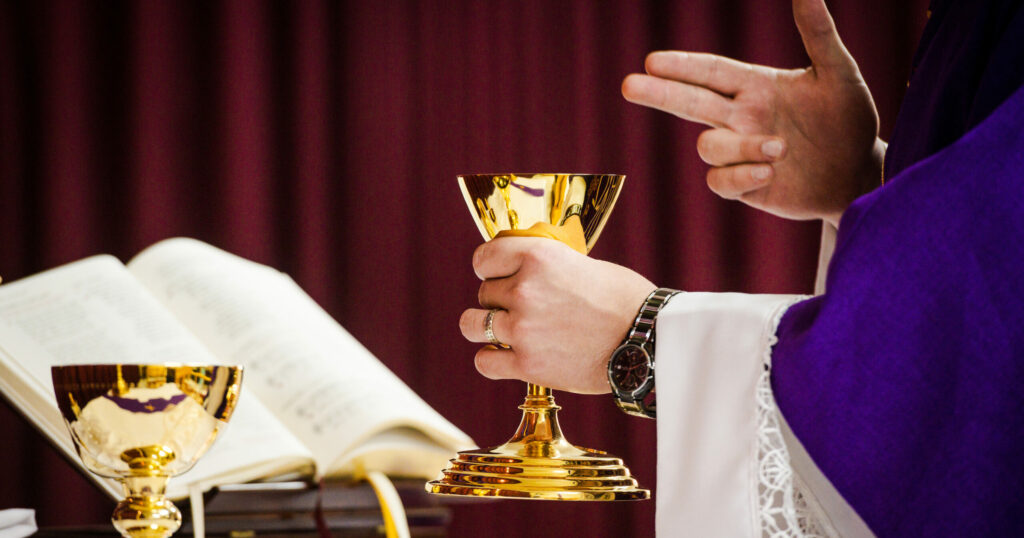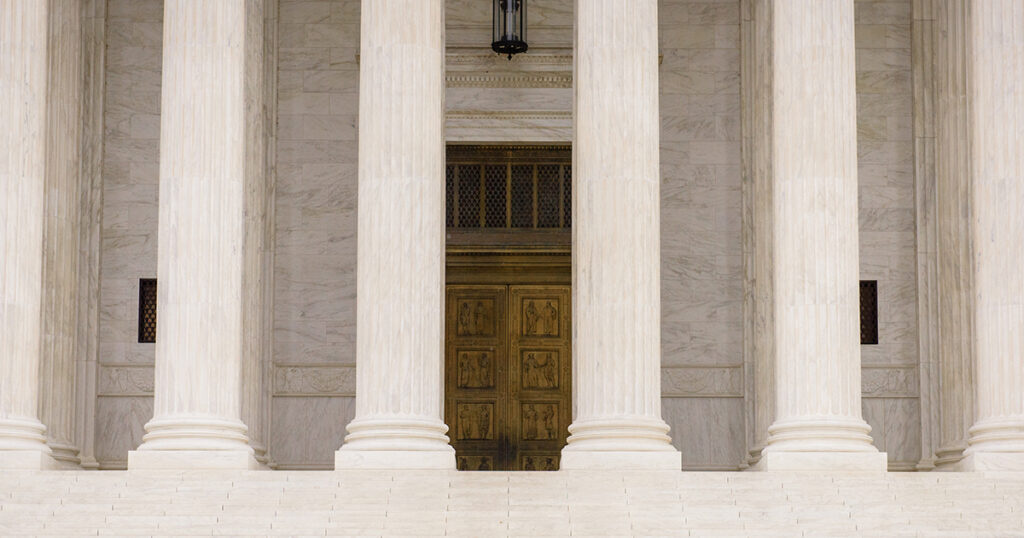Speaking with friends and family about the Lord’s Supper
by Mark J. Buchhop
“Pastor, I want to invite my friend to church, but I don’t know how to explain our Communion practices. Could you please help me with that?” That question might be one of the most important questions any pastor could answer. It really matters how parishioners deal with closed Communion when they visit with friends or family members who are not members of The Lutheran Church—Missouri Synod (LCMS). This question might even be a reason why some are afraid to invite someone to church.
A difficult conversation
A growing number of people in our midst, including our family and friends, simply do not attend any congregation at all. They may have little or no biblical knowledge of the Sacrament. Or they may think that there is little difference between the many different Christian denominations regarding the Lord’s Supper. But this certainly is not the case. Christian denominations hold many different beliefs and practices, some of which oppose the biblical view of the Lord’s Supper.
To make the conversation a bit easier, first review Luther’s Small Catechism. Luther writes, “What is the Sacrament of the Altar? It is the true body and blood of our Lord Jesus Christ under the bread and wine, instituted by Christ Himself for us Christians to eat and to drink” (SC VI; see also EP VII 6–9, 15).
Start with Jesus
Start the conversation with Jesus. Our family and friends probably know a little about Him. It is a good starting point in your conversation.
Jesus is true God and Man. He is our Brother. He is our flesh and blood, yet without sin. He is our substitute, Savior and Redeemer. We attend the Divine Service to learn about and grow in His love, grace and forgiveness. He is not simply a wise man, a wonderful example of how to live a good life, but someone to be revered and respected because He is true God.
To explain this, you might use an illustration from C.S. Lewis’ book The Lion, the Witch, and the Wardrobe. He gets at this reality of Jesus when he discusses Aslan. “Aslan is a lion — the Lion, the great Lion.” “Ooh” said Susan. … “Is he — quite safe? I shall feel rather nervous about meeting a lion.” … “Safe?” said Mr. Beaver … “Who said anything about safe? ’Course he isn’t safe. But he’s good. He’s the King, I tell you.”[1]
Attending the Lord’s Supper means entering the presence of Christ the King. It is His meal, not ours to do with as we please. With that in mind, our conversations about the Supper should focus on entering the presence of God.
How dare any sinner approach the Lord’s Table and come into direct physical contact with the King? St. Paul instructs us to examine ourselves before we come (1 Cor. 11:27–28). This examination will always show our need for forgiveness, rescue and salvation. Discussing this examination may help your family or friend see their sin and need for forgiveness.
Then explain how we confess our sins each Sunday, and how God, who is faithful and just, forgives our sins and cleanses “us from all unrighteousness” (1 John 1:9). Jesus desires that all repent and come to the knowledge of the truth (1 Tim. 2:3–4). For this reason and in spite of our sins, Jesus comes in the Lord’s Supper to serve us forgiveness.
At the cross
Now this conversation about the Lord’s Supper is headed in the right direction; it is headed to the cross. The cross of Jesus is the only reason anyone may approach Christ the King. Jesus makes us worthy by taking all our sins to His cross. Thus, as the pastor distributes Christ’s body and blood, he speaks Jesus’ words: “given” and “shed for the forgiveness of your sins” (LSB, p. 199).
Our enemies — the devil, the world, our sinful flesh — have not changed. Only Jesus has the medicine of life. In the Divine Service, He serves us His risen, living body and blood, hidden under simple bread and wine. He unites us with His victory over all our enemies, making us citizens of His kingdom. For, “where there is forgiveness of sins, there is also life and salvation” (SC VI).
The conversation
Now it is time to turn the conversation with your family and friends to closed Communion. It is always best to have this conversation before the day of the Divine Service. If you are concerned that the conversation will be especially antagonistic, ask your pastor for additional guidance. Encourage your guests to speak with your pastor also; he often has the closed Communion conversation and can help diffuse a tense conversation.
Explain how closed Communion is a loving practice. As St. Paul taught, those who receive the Lord’s Supper in an unworthy manner eat and drink to their harm and not their blessing. We would be unloving to commune those who would receive the Supper to their harm. Jesus gives His Supper as a blessing.
Also emphasize the gifts and giving of Jesus. You might say, “I’m glad you asked about the Lord’s Supper. The Lord’s Supper is such a powerful and beautiful meal. We would love to have you receive these gifts. Our church invites non-LCMS members to learn more about it so they may receive it too. Pastor would love to visit with you to offer instruction about this wonderful Sacrament, so you may commune with us soon. Would you like me to join you when you visit with him?”
As you share about the Lord’s Supper, focus on the Lord Jesus and all He has done for us.
[1] C.S. Lewis, The Lion, the Witch, and the Wardrobe (New York: Harper Collins, 1950): 79–80.
This article originally appeared in print in the November 2020 issue of The Lutheran Witness.






Excellent article. Im alarmed and saddened that even LCMS parishioners don’t understand our doctrine and the historical practice of closed communion. Many have been Lutherans all of their lives, or for decades. It needs to be taught by Pastors, just as the catechism needs to be taught- over and over.
PAX DOMINI
Being a non practicing catholic. I’m asking if I can receive the sacrament in another place?? In my experience with the catholic church they’re only good at screwing up alot and they hide behind God when they do. When did God become a scapegoat for pedafiles?? I hold communion as the greatest of all things a person can do but I swore off the catholic church.
Frank,
Pedophilia has no place in the church, regardless of denomination. There are also other reasons to search for a more faithful expression of the Christian faith than the Roman Catholic church. For example, the Lord’s Supper — communion — is not our work, but in fact a work of God. You’re correct in stating that the Roman Catholic church makes it a work of man. But Scripture says this is the gift of Christ’s body and blood for our forgiveness. His work; not ours.
I suggest you find a local LCMS congregation (locator.lcms.org) and contact the pastor. I’m certain he will be delighted to catechize you into the Lutheran faith, after which you may join the congregation at our Lord’s altar.
RSA
Ridiculous, the Lord’s table is not an exclusive club. Let’s embarrass people who try and partake, then wonder why your numbers have shrunk. Jesus is Jesus, he doesn’t belong to any denomination
I dropped out of OCIA Ain the Catholic Church because of closed communion. The same rationalizations used by the Catholics to justify such an exclusionary practice are being used here. The reality is that some Christians see a need to practice second-degree separation; dividing themselves from both non-believers and fellow Christians who may have differing interpretations of scripture and church teachings. It drove me to tears during Mass on several occasions; by the time I had to stop attending, watching Communion had become unbearable. The “pastoral blessing” reduced those closed off from the Eucharist from “ partaking of the Lord” to “we acknowledge that you exist.” I can get that at any retail or food service establishment. I would encourage any church practicing this to remove their spiritual fencing, and I would encourage any individual attending a church that refuses to do so to leave.
With the exception of some denominations most churches recognize they do not have the authority to bar the children of God from the Lord’s table. The Lord’s table does not belong to a denomination and Paul admonishes the church for squabbling over such things. Jesus admonished his disciples over barring the little children from Him, and Jesus himself in the book of Matthew calls Judas out for his coming betrayal then proceeds to pass communion saying “all of you” eat and drink. It is important to approach God’s table with a right heart with God, but only God has the authority to judge the heart and only God has the authority to invite I’ll turn away someone. It’s the Lord’s supper not the Roman Catholic’s supper (although they are invited they do not have ownership to deny others) So approach at your own risk and know all children of God are invited. Anyone but God Himself who denied you access to the Lord’s table when you are a believer and child of God professing Jesus as your Lord and Savior, has added to the scripture and taken on false authority contradicting God Himself. It speaks about that in Revelations, woe to anyone who adds to the word of God or takes away. I went to a wonderful Anglican church and many other denominations that do not attempt such things as pretending the Lord’s supper and His invitation to it are their supper and they can give or resend the invite God already extended. I hope you find a place to land where you can heal within the body of Christ.
I personally think that you are cherry picking the Bible to suit your needs. The idea of closed communian is absurd. For those of us in other Christian churches where we have a open communion all are welcome at the table. I for one know exactly why I am taking the body and the blood. I do not need to be told that my beliefs are wrong simply because I’m not of that church. As we know Jesus took communion with all. Be it the sinner or the saint. So how can you sit back and judge who is worthy and who is not? Ian merely proposing these questions in my search to understand. Thanks
Can a LCMS church offer communion without wine ? There are many my family and I have attended in out travels where this is done. These churches profess to be LCMS churches.
I have alcohol issues in my family and Pastor will not offer grape juice or any other alternative. He will dilute the wine with water but it still has the wine in it . He insists this the only true fruit of the vine. Please give me input on this issue.
Thank you !
Dennis,
Greetings. Your pastor’s advice and direction is correct. It is not correct practice to offer communion without wine.
what an excellent explanation for everyone
Jesus is Host. He knew Judas and his fault yet he was not denied. It is between me and Jesus. It is not between me and our Pastor or Priest or Preacher. To me such reliance’s are man made. They seem not ordained by Jesus.
Good article to be read more than once and to be heavily pondered. Thank you.
I’m not sure using Judas as the indicator of whether or not we should commune someone is a good tactic. On the one hand, there’s no guarantee that Judas as at the table. According to the Gospel of John, Judas leaves the table at some point. On the other hand, if he was at the table, he bore the judgement for his sin. It’s yet a further reason to practice Closed Communion.
Now, you are correct that the Lord’s Supper does not take place between you and the pastor. But the pastor is not work on his own behalf; he is there as Christ’s representative (cf. John 20:19–23). He cannot speak more or less than God’s Word because he does not have anything to offer but what Christ offers; he has nothing to speak except what Christ speaks. But when he does speak, he speaks from the authority of Christ (Luke 10:16).
Furthermore, also note my comment below. Faith is personal, but it’s never private. We publicly confess what we believe in a number of ways, not the least by virtue of the church to which we belong. That must have a bearing as pastors provide loving care for those entrusted to their care.
I agree with you. I think it is ridiculous for an elder to approach someone before church and decide if they are worthy to take communion. That is between that person and Jesus and no one else. They may have not laid eyes on that person and they quiz them. A lot of people are really put off by it. I am a Lutheran and I am put off by it.
Me too. Luther tells to examine ourselves which is correct. Between the communicant and God. The pastor can no more see if one has examined himself or not than can the person sitting next to me in church can. None of the disciples were LCMS. If the pastor is aware someone is making a mockery of the sacrament then obviously he should withhold it. But at the rail he has to rely on the communicant having prepared himself
This idea (that your faith is between you and Jesus) is a very American thing, but not Christian. Yes, faith is personal but not private! You don’t merely believe that what is said of Jesus is true; you believe that Jesus IS TRUE! See the difference? And Jesus never once says “keep it inside, it’s between you and me, leave your pastor out of it.”
The Pastoral office has been scandalized over the past few decades, that’s for sure, by both pastors who scandalize the office, and others who decide that the pastors are nothing more than employees of the church. Both are horrible. Pastors are God’s called servants, set apart as representatives of Jesus Himself to preach the Scripture and Administer the Sacraments.
I encourage you to read the Pastor’s Ordination Rite in the LSB Agenda or the Pastor’s Installation Rite, also found in the Agenda. They vow to some pretty hefty things! No member who is under the care of a pastor should ever expect the pastor to break his vows, not ever. When a pastor is forced to provide communion to anyone because “it’s between me and Jesus” he is not only doing a horrible disservice to the members, but he is breaking his vows and being unfaithful to Jesus.
Inasmuch as Paul was involved with the communion practice and who should or shouldn’t commune (1 Corinthians 11), we pastors are also called to be involved. It may not be comfortable or “inviting” or “inclusive”, but whoever said it has to be? Not Jesus, that’s for sure.
Your premise is incorrect. Communion is not between “you and Jesus”. The idea that the Christian faith, in general is a “between you and God” thing is wrong. This idea is an Americanized, rationalized idea, but not orthodox. We are one body in Christ — may parts — but one body. We are called to believe, teach, and confess in common unity, and NOT each person believing as he/she pleases. Closed Communion is one way of training/teaching/disciplining one another into a unity of faith and repentance.
The pastor is given authority through the church by God to open and close communion. It’s the same authority he has to forgive and retain forgiveness. It’s given to the whole church, and to the pastor for the church (John 22). To say that it isn’t the pastor’s place to do this is to rob the holy office of its God-given authority.
Now, a pastor cannot simply bar a person from communion because he feels like it or because he doesn’t like the person. There are only two reasons for which a pastor MUST — out of Christian love and concern — close communion to someone. First, because the person confesses a different doctrine. A non-member is assumed to be out of orthodoxy because he has not been tested by the church. This practice is as old as the church. In the early church, priests and bishops would strictly forbid anyone from receiving the Lord’s Supper who was not orthodox, vis., was not catechized and authorized to commune. The deacons would literally escort the unauthorized out of the service and bar the doors before the priest or bishop would continue with the sacrament. This has been the “normal” practice since the time of the Apostles…that is, until America decided that everyone can believe as they please without any sort of theological training or catechesis.
The second reason a pastor is obligated to close communion to a person is if the person is committing wonton/open/unrepentant sin. Even if it’s a member of the congregation, if he is committing sin openly and without repentance, the pastor must close communion to him. Again, this is orthodox and Scriptural.
Confession/beliefs and repentance. And, yes, closing communion to a person who is unrepentant or who confesses a different faith than we do might hurt…but it’s supposed to! It’s meant to bring a person to acknowledge his sin and to bring a person to a right/orthodox/faithful understanding.
just saw this…glad it was posted pre-pandemic, seems issues have changed for many of us pastoring congregations. A bigger, and I think more significant question would be, “How do we reengage God’s people in weekly on site worship. Deciding to exclude before we invite seems to be a bit out of context. I always seem to be swimming upstream on this stuff.
Who am I, who is the Pastor, who is the LCMS to judge a person’s mind and heart? Only one who has that right is God himself. Therefore I say these things should be stated before Communion and each individual be thier own judge.
Robert,
Faith is personal; I cannot believe for another. But faith is never private. “With the mouth one confesses and is saved,” writes St. Paul; we publicly confess what we believe. Part of the way we make this public confession is by virtue of the church body to which we belong. Christ also gives the responsibility to pastors to be faithful stewards of His gifts (1 Cor. 4:1–5). The pastor who does not faithfully steward the office does not answer to men, but to God. See also God’s warning of Ezekiel in Ezekiel 3. Or, again, the writer to the Hebrews exhorts his hearers to submit their “overseers” (pastors, today), since those pastors will have to give account — before God — of their service. As an overseer, part of their responsibility is to judge the public confession of those who come to their altar and withhold the sacrament from those whom it would harm. The pastor and the LCMS does not judge the heart; we do judge the outward confession (Romans 16:17–18).
I agree!!!
I think you have it right
Preparation for Communion goes beyond learning what The Lord’s Supper is. It includes learning the entire confession of our Faith since Communion at an altar is a confession of the unity of doctrine at that altar.
Amen
amen to YOUR amen!
This article reinforces my eternal gratitude that I was blessed in being born an Episcopalian, where we have open Communion, and I have been one for all of my 79 years. Would not be happy any other place, as it fits me perfectly. We, nor our priests, judge whether a person is welcome at our table or not. Thanks be to God!
Yes, agreed, overall, an excellent piece written by Pastor. This conversation DOES start with Jesus, Almighty God/perfect man. Certainly “we learn and grow” in our attendance in HIS Divine Service. However, we are not the focus. Almighty God Lord Jesus Christ is serving us Himself, Body and Blood, in HIS Divine Service. Our focus is HIS Service, HIS delivery of Salvation, forgiveness of sins and eternal life in the Sacrament. The Service of the Word and the Service of The Holy Supper are always focused on Christ, HIM crucified for the sins of the world and for our sins. Our Almighty Savior is the Subject of the action, and not us. HIS Gifts are for us. He is sacramental Absolution, Word&Sacrament our monergistically, and HE deigns to receive our thanks in the sacrificial responses of His Divine Service. We joyfully welcome visitors of another confession to join HIS Confession Given to us, knowing that unity of Doctrine and Unity of Confession precede the communion of saints, the Communion of His Holy Body and Blood.
Hello, Can you email this article to me in such a way that I can print it and also the replies?
What does it mean to say that it is in Communion that Christ is “making us citizens of His kingdom”? Isn’t such citizenship obtained as soon as someone comes to faith? (Phil. 3:20) Are not even the youngest children of God “citizens of His kingdom” years before they begin to come to Communion? (Matt. 19:14)
How does one explain that less than an hour after sins are completely forgiven in the Absolution during the Divine Service, parishioners will go to Communion for more forgiveness?
An excellent write by Pastor Buchop